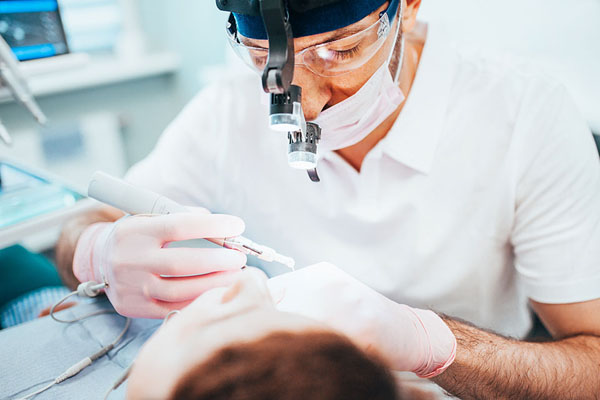Know When to Visit the Dentist for a Dental Crown
Dental crowns play a vital role in restoring damaged teeth, improving aesthetics, and ensuring long-term dental health. If you’re experiencing dental issues or have concerns about the condition of your teeth, it’s important to recognize the signs that indicate a dental crown may be necessary.
Dr. Jonothan Royal, a trusted dentist in Vero Beach, is here to guide us through this informative journey.

Do You Need a Dental Crown?
Severe Tooth Decay or Cavities
When tooth decay or cavities progress to an advanced stage, a dental crown may be necessary to restore the tooth’s structure and prevent further damage.
- Pain or Tooth Sensitivity: If you experience persistent toothaches or sensitivity to hot or cold substances, it could indicate that the decay or cavity has reached the nerve of the tooth. In such cases, a dental crown may be necessary to protect the tooth and alleviate discomfort.
- Visible Signs of Decay: If you can see visible signs of decay, such as dark spots, holes, or pits on the surface of your tooth, it’s a clear indication that the decay has progressed significantly. A dental crown can help restore the tooth’s structure and prevent further damage.
Cracked or Fractured Teeth
Accidents or trauma can lead to cracked or fractured teeth, compromising their strength and function.
- Pain When Chewing: If you experience pain or discomfort when biting or chewing, it could be a sign of a cracked or fractured tooth. The pressure applied during chewing can cause the crack to widen, resulting in pain. A dental crown can help stabilize the tooth and distribute the biting forces more evenly, reducing pain.
- Sensitivity to Temperature: Cracked teeth can be sensitive to hot or cold temperatures. If you feel a sharp, fleeting pain when consuming hot or cold substances, it may be a sign of a cracked tooth. A dental crown can provide protection and insulation, reducing sensitivity.
- Visible Cracks or Fractures: In some cases, you may be able to see visible cracks or fractures on the tooth. These cracks can vary in size and location, ranging from small surface cracks to more extensive fractures. A dental crown can cover and support the damaged tooth structure, preventing further propagation of the crack.
- Tongue or Cheek Irritation: If a cracked tooth has rough or jagged edges, it can irritate the tongue or inner cheek. You may experience discomfort or notice small cuts or sores in these areas. A dental crown can smooth out the surface of the tooth, eliminating irritation.
Large Fillings
If you have a tooth with alarge filling, it may become weak over time.
- Failing or Deteriorating Filling: Over time, large fillings can weaken or deteriorate due to factors such as wear, recurrent decay, or fracture. If you notice that your filling is dislodged, cracked, or no longer providing proper coverage, a dental crown may be necessary to restore the tooth’s strength and function.
- Tooth Sensitivity: Large fillings can make the tooth more sensitive to hot or cold temperatures. If you experience increased sensitivity or discomfort when consuming hot or cold substances, it could be a sign that the filling is no longer adequately protecting the tooth. A dental crown can provide better insulation and reduce sensitivity.
Root Canal Treatment
After undergoing a root canal treatment, the affected tooth may require a dental crown to protect and strengthen it. A crown adds an extra layer of protection, ensuring the longevity of the tooth.

Misshapen or Discolored Teeth
Do you have misshapen or severely discolored teeth that affect your smile? Dental crowns can be an effective cosmetic solution to enhance the appearance of your teeth, providing a natural-looking and uniform smile.
Dental Bridge Attachment
When replacing a missing tooth with a dental bridge, the adjacent teeth that support the bridge may need dental crowns. Crowning these teeth ensures they can provide a stable foundation for the bridge, ensuring a secure and functional replacement.
Cracked Enamel
The outer layer of your teeth, known as enamel, is crucial for protecting the inner structures. If your enamel is cracked or significantly worn down, a dental crown can shield the affected tooth from further damage.
- Visible Cracks or Lines: If you notice visible cracks or lines on the surface of your tooth enamel, it could be a sign of enamel damage. These cracks may be hairline or more significant, depending on the severity of the condition. A dental crown can help protect the cracked enamel and prevent further propagation of the cracks.
- Rough or Jagged Edges: Cracks in the enamel can create rough or jagged edges on the tooth surface. These rough edges can irritate the tongue, cheeks, or gums, leading to discomfort or soreness. A dental crown can smooth out the surface, improving comfort and preventing further irritation.
- Discoloration or Stains: Cracked enamel can sometimes result in discoloration or staining of the affected tooth. This occurs when food particles or pigments enter the cracks and become trapped, leading to noticeable changes in the tooth’s color. A dental crown can restore the tooth’s natural appearance and provide a seamless, uniform color.
Tooth Grinding (Bruxism)
Persistent tooth grinding, also known as bruxism, can lead to excessive wear and tear on your teeth. Dental crowns can help restore the shape and structure of your teeth, preventing further damage caused by grinding.
- Worn or Flattened Tooth Surfaces: Bruxism can cause excessive wear on the tooth surfaces over time. If you notice that your teeth appear flat or have developed uneven wear patterns, it may indicate tooth grinding. A dental crown can restore the natural shape and structure of the teeth, protecting against further damage.
- Jaw Pain or Headaches: Bruxism can contribute to jaw pain, temporomandibular joint (TMJ) disorders, and headaches. If you frequently wake up with a sore jaw or experience recurring headaches, it may be due to the excessive grinding of your teeth. A dental crown, in combination with other treatments, can help alleviate these symptoms by improving the occlusal (bite) relationship.
- Tooth Mobility: Prolonged bruxism can lead to the loosening of teeth. If you notice that one or more teeth have become slightly mobile or feel loose, it could be a result of the excessive forces applied during grinding. Dental crowns can provide stability and support to the teeth, reducing mobility.
Dental Implant Restoration
When replacing a missing tooth with a dental implant, a dental crown is typically used to cover the implant post. This crown acts as a natural-looking replacement tooth that blends seamlessly with your smile.
Aesthetic Concerns
If you are unhappy with the appearance of your teeth due to gaps, misalignment, or other cosmetic issues, dental crowns can help you achieve the smile you desire. They can improve the shape, size, and color of your teeth for a more aesthetically pleasing result.

Choosing the Right Dental Crown
When considering a dental crown, it’s essential to understand the different types available. Your dentist will recommend the most suitable option based on your specific needs and may be able to place the crowns in one appointment. Let’s explore some common types of dental crowns:
- Porcelain Crowns: These crowns are known for their natural appearance and are excellent for restoring front teeth. They can be color-matched to blend seamlessly with the surrounding teeth.
- Zirconia Crowns: Made from a durable and biocompatible material called zirconium dioxide, these crowns offer exceptional durability and resistance to chipping or cracking. Zirconia crowns are known for their translucent appearance.
- Metal Crowns: Made from metals like gold or silver alloy, metal crowns are durable and resistant to wear. However, their metallic appearance makes them more suitable for molars or teeth less visible when you smile.
- Porcelain-fused-to-metal (PFM) Crowns: These crowns combine the strength of metal with the aesthetic appeal of porcelain. They’re a popular choice for both front and back teeth.
Factors to Consider
When considering a dental crown, there are several important factors to keep in mind. These factors can help you make an informed decision and ensure the best possible outcome for your dental health.
- Longevity: Dental crowns are designed to be long-lasting, but the actual lifespan can vary depending on factors like oral hygiene, habits, and the material used. Discuss the expected longevity of different crown options with your dentist.
- Cost: The cost of dental crowns can vary based on factors such as the material chosen, the complexity of the procedure, and your location. Discuss the cost and payment options with your Location dentist.
- Appearance: If you have cosmetic concerns, such as front teeth that are visible when you smile, consider the aesthetic aspect of the crown. Porcelain or all-ceramic crowns are excellent options for a natural and pleasing appearance.
- Tooth Preparation: The extent of tooth preparation required for a dental crown can vary. In some cases, minimal preparation is sufficient, while in others, more significant reshaping may be necessary.
Frequently Asked Questions
Which type of dental crown is best?
The choice of the best dental crown depends on various factors, including the specific dental condition, location of the tooth, aesthetic preferences, and budget. Porcelain crowns are often favored for their natural appearance, while metal crowns provide excellent durability. Porcelain-fused-to-metal (PFM) crowns offer a balance between strength and aesthetics. Your dentist will evaluate your needs and recommend the most suitable crown type.
How long will a tooth last without a crown?
Without a crown, a tooth that requires one may be at higher risk of damage or decay. The longevity of a tooth without a crown depends on factors such as the extent of damage, oral hygiene practices, diet, and habits like teeth grinding.
What if I don’t get a dental crown?
If a tooth requires a dental crown, but you choose not to get one,several complications may arise. The tooth’s structural integrity may be compromised, leading to further damage, such as cracks, fractures, or decay. This can result in pain, sensitivity, and even tooth loss. It’s best to follow your dentist’s advice and a dental crown when necessary to preserve the tooth’s health and function.
Are there alternatives to dental crowns?
Yes, alternative dental treatments are available depending on the specific dental condition. Some alternatives to dental crowns include dental veneers, which are thin shells bonded to the front surface of the teeth to improve aesthetics, and dental bonding, which involves applying a tooth-colored resin to repair minor chips or cracks. However, these alternatives may not be suitable for all cases, and your dentist will assess your needs and recommend the most appropriate treatment option.
Begin Your Journey to a Restored Smile with Dental Crowns
Understanding the signs you need a dental crown is crucial for maintaining optimal dental health and addressing dental concerns effectively. By recognizing the indications, considering the factors, and discussing your options with a dental professional, you can make an informed decision that aligns with your needs and goals.
Take the first step towards a healthy smile by contacting Dr. Jonothan Royal to schedule a consultation at our Vero Beach practice and learn more about how dental crowns can benefit you.

Get Your Complimentary
Consultation or 2nd Opinion
- Exam
- Full mouth X-ray
- Private Consultation with Doctor ($350 value)
- 3036 20th St,
Vero Beach, FL 32960 - (772) 778-5550
Working hours
- Monday: 8am - 5pm
- Tuesday: 8am - 5pm
- Wednesday: 8am - 5pm
- Thursday: 8am - 5pm
- Friday: 8am - 1pm
- Saturday & Sunday: Closed
